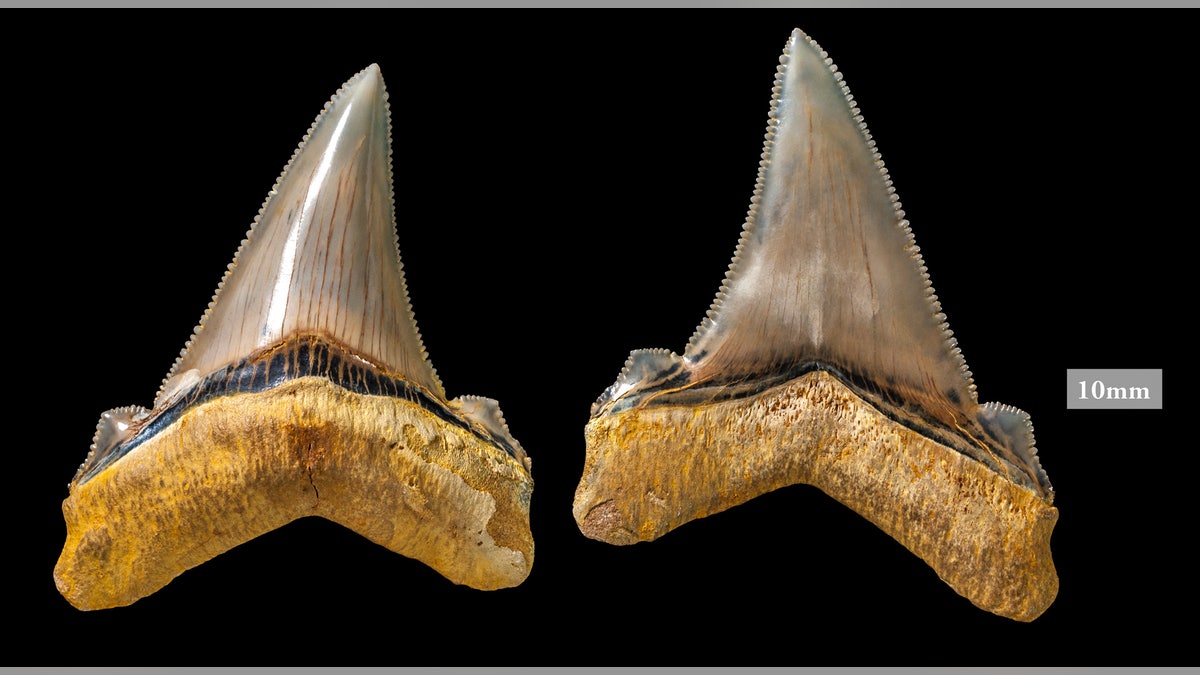
Carcharocles angustidens teeth. (Credit: Museums Victoria)
You're gonna need a bigger... dentist?
An Australian teacher and fossil enthusiast stumbled upon the finding of a lifetime when he uncovered a set of fossilized 3-inch teeth from an extinct shark, known as the great jagged narrow-toothed shark or Carcharocles angustidens.
Phillip Mullaly said that he couldn't believe what he saw, as he walked along Jan Juc, a beach town and well-known fossil site along Victoria’s Surf Coast in Australia.
MEGALODON: TERRIFYING FACTS ABOUT THIS PREHISTORIC MONSTER
“I was walking along the beach looking for fossils, turned and saw this shining glint in a boulder and saw a quarter of the tooth exposed," Mullaly said in a statement. "I was immediately excited, it was just perfect and I knew it was an important find that needed to be shared with people."
The teeth, which measure 7 centimeters (2.7 inches) long, belong to one of the largest ocean predators to ever live. Great Jagged Narrow-Toothed sharks grew up to and surpassed 30 feet in length, roaming the ancient seas.
Finding teeth are important for understanding how ancient sharks lived, as the majority of their bodies are made up of cartilage, which unlike bones, does not fossilize.
By comparison, great whites have been known to grow up to 20 feet in length, including the shark known as "Deep Blue," the largest great white ever caught on camera.
MASSACHUSETTS MAN CAPTURES STUNNING VIDEO OF SHARK LEAPING FROM WATER WITH JAWS OPEN
The megalodon, of which the Great Jagged Narrow-Toothed shark is a cousin, is commonly accepted to have reached 60 feet in length. However, some scientists have theorized it could have been 80 feet long.
The megalodon, which went extinct 2.6 million years ago, is being featured in the new movie "The Meg," starring Jason Statham.
Great Jagged Narrow-Toothed sharks were the top predators of their time, having lived approximately 25 million years ago. They feasted on ancient whales, among other sea creatures.
Mullaly's find is especially rare, as most shark fossils consist of a single tooth, largely due to sharks constantly losing teeth throughout their lifetime. From Dec. 2017 to Jan. 2018, Mullaly and a team from Musuems Victoria uncovered more than 40 teeth in total, with many belonging to the Great Jagged Narrow-Toothed shark.
The other teeth that were found belong to a variety of other sharks, including sixgill sharks, which are still alive today.
PREVENTING SHARK ATTACKS: WHAT YOU NEED TO KNOW
“I was in a bit of shock actually because I saw it and I thought this is looking like it’s complete, like it’s just fallen out of a shark’s mouth even though it’s 25 million years old,” Mullaly said according to Yahoo 7 News.
“These teeth are of international significance, as they represent one of just three associated groupings of Carcharocles angustidens teeth in the world, and the very first set to ever be discovered in Australia,” Dr. Erich Fitzgerald, Senior Curator of Vertebrate Palaeontology at Museums Victoria said in a statement.
The teeth have been donated to the Melbourne Museum, where they are currently on display until October 7.
Follow Chris Ciaccia on Twitter @Chris_Ciaccia








































